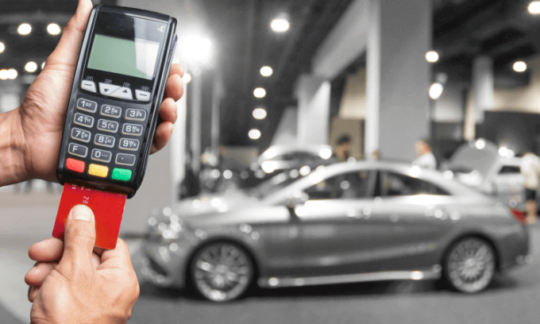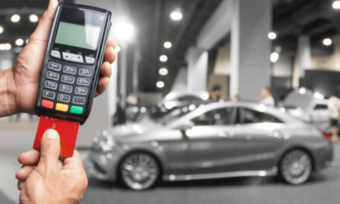Can you buy a car with a credit card?

Key points:
- It’s possible to buy a car with a credit card if the seller and card provider allows it.
- That said, using a credit card could be an expensive and inconvenient way to buy a car.
- Other forms of payment may make more financial sense for you in the long run.
Can you buy a car with a credit card?
The short answer is yes, it’s possible to buy a car with a credit card if the seller agrees to take that form of payment and your credit card issuer allows it. Given that credit cards come with features like points and cashback to reward you for spending, it may even seem like a reasonable idea to make a large purchase like a car on a credit card.
That said, buying a car can be a big financial commitment, and credit card interest rates are often higher than other types of loans. So, it’s a good idea to weigh up the different ways of paying for one, as well as the pros and cons of making this kind of purchase with a credit card, as this could make a big difference to how much the car costs you in the long run.
What are the pros of buying a car with a credit card?
Some potential upsides to buying a car with a credit card can include:
- Pre-approved finance: Unlike applying for a car loan or personal loan, your credit card is a pre-approved line of credit, meaning you are able to spend up to your credit limit without checking with the lender first.
- Low rate and low fee options: You can minimise the interest you pay on a car by using a credit card with a low introductory interest rate. This can mean paying 0% interest or a very low rate for the first few months. Also, it makes sense to compare credit cards to make sure you have chosen the one that best suits your financial and personal needs.
- Rewards points: Another benefit of buying a car with a credit card is that you can potentially earn rewards. And since buying a car is typically a large transaction, you may be able to earn a lot of points in one go by paying for a large purchase with your card.
What are the cons of buying a car with a credit card?
There are several potential disadvantages and risks when it comes to buying a car with a credit card, including:
- High interest rate, fees and charges: Depending on the credit card you apply for and your credit score, you could find yourself in a situation repaying a credit card that has a high interest rate, fees and charges.
- Balance transfer not guaranteed: You shouldn’t expect that you will be able to buy a car using a credit card, then switch to a balance transfer when the introductory period ends on your first credit card. Canstar Research has found that most credit cards limit the amount that can be put onto a balance transfer to a percentage of the card’s approved credit limit and that every time you apply for a balance transfer, the application can show up on your credit report which may negatively affect your credit rating.
- Cash flow: If you were previously using your credit card as a cash flow tool, putting a large purchase like a car on the card may severely restrict your ability to use the card when you need to.
- Missing out on interest-free days: While you are carrying an outstanding balance on your credit card (the car debt), you will not enjoy the usual interest-free days on any other purchases you make using the card.
- Surcharges: You may be required to pay a surcharge if you use certain types of credit cards. However, a limit applies to the amount that can be charged, depending on the type of card or payment method that you use. The business is required to let you know if there is a surcharge payable (before you pay it), according to the Australian Competition and Consumer Commission (ACCC). Contact the ACCC.
- Revert rate: When the introductory period ends on a low rate or balance transfer credit card, the revert rate that applies can be the cash advance rate. This could potentially see you paying a far higher interest rate than you’d pay with a personal loan.
- Budgeting willpower: It’s easy to fall into the trap of only paying the ‘minimum repayment’ for a credit card. Canstar Research has found that credit card minimum repayments usually have both a fixed dollar amount and a percentage amount, and whichever is higher is the one that is applied each month. Sticking to the minimum repayments will tend to drag out the debt, making it harder to repay your car in full before a low introductory interest rate disappears and likely costing you more in the long run.
- Annual fees: Credit cards charge an annual fee. Factor this into your calculations when deciding whether it would be cheaper to buy a car with a credit card, a loan or savings.
How do you buy a car with a credit card?
In much the same way as any other purchase, to buy a car with a credit card you need to provide your credit card details either via an in-person electronic method such as a point-of-sale device or online. However, there could be a few barriers to this payment going through, such as:
- Your credit limit: The credit limit is the amount of money you are allowed to borrow at any one time on that card. Your purchase could be declined if your car purchase is more than this limit, in which case you might have to make alternative arrangements.
- Your daily transaction limit: If your card has a daily limit it means that you can only spend up to a certain amount per day, regardless of what the credit limit is on your card.
If you plan to buy a car with a credit card, it might be a good idea to call your provider first to find out if there’s any changes that they can make – such as temporarily lifting your transaction limit – to allow the purchase to occur. Different options to pay for or finance a new or used car include:
- A car loan
- A personal loan
- A hire purchase agreement
- A novated lease agreement (salary sacrificing)
- Redrawing on your home loan
- Using your savings
Should you use a credit card to buy a car?
Whether or not it’s appropriate to buy a car with a credit card comes down to your own personal financial situation. However, due to the nature of credit cards, it’s a good idea to seriously consider whether or not using your credit card to buy a car makes good financial sense.
Credit cards can have high interest rates, fees and charges, and you could damage your credit rating if you don’t make regular repayments on time. Another big stumbling block around buying a car with a credit card is that you’re likely to be limited to buying through a car yard. It’s unlikely a private seller will have the facilities for you to pay using a credit card.
There are several situations in which you could consider using your credit card to buy a car:
- You’ve been knocked back for a car loan: However, if you have a poor credit rating, it may not be a good idea to consider borrowing money on a credit card either.
- You want to buy a car sooner: If you have sufficient credit on your credit card, it saves time in waiting for a car loan to be approved.
- You want to split the cost of the car between multiple payment methods.
- You’ve scored a 0% or low rate credit card, and you’re confident you can pay off the car quickly to minimise interest charges.
- You can earn rewards points by putting the car on your credit card.
Before you decide how to finance your new ride, it’s a good idea to draw up a repayment plan to see whether or not you could actually afford to repay such a large debt. Canstars Budget Planner may be helpful. You can calculate what kind of monthly repayments you could afford using Canstar’s Car Loan Calculator.
How much can you put on a credit card when buying a car?
How much you can put on a credit card when buying a car can vary on a dealer-by-dealer basis. Bear in mind though that dealerships may push for you to take out dealer finance rather than accept payment by credit card. This way, the dealer may earn a profit on the sale of the car, plus interest on the finance deal.
If you decide to use a credit card to buy a car, be sure to give your bank a call beforehand as large purchases can be flagged as potentially fraudulent transactions. You can avoid this by letting the card provider know ahead of time that you expect to make a substantial payment on your card.
Why might a car seller refuse to take a credit card as payment?
Businesses are allowed to specify their accepted payment methods. When a customer uses a credit card to pay for something, businesses are charged a range of fees by financial institutions and credit card providers. When it comes to cars, which can be an expensive purchase, these fees could add up and may be the reason why the car dealer may not accept a credit card as a form of payment.
There are also other business costs, such as the resources and infrastructure needed to access the payments system itself. Some organisations may pass on this cost in the form of a surcharge, or an extra fee on top of the cost of the car. But there are strict rules around how much this surcharge is and how it has to be displayed to the customer.
The comparison rates for car loans are based on credit of $30,000 and a term of 5 years, unsecured, unless otherwise stated.
^WARNING: This comparison rate is true only for the examples given and may not include all fees and charges. Different terms, fees or other loan amounts might result in a different comparison rate.
 24hr approval available
24hr approval available
 24hr approval available
24hr approval available
 24hr approval available
24hr approval available
Canstar may earn a fee for referrals from its website tables, and from Sponsorship or Promotion of certain products. Fees payable by product providers for referrals and Sponsorship or Promotion may vary between providers, website position, and revenue model. Sponsorship or Promotion fees may be higher than referral fees. Sponsored or Promotion products are clearly disclosed as such on website pages. They may appear in a number of areas of the website such as in comparison tables, on hub pages and in articles. Sponsored or Promotion products may be displayed in a fixed position in a table, regardless of the product’s rating, price or other attributes. The table position of a Sponsored or Promoted product does not indicate any ranking or rating by Canstar. For more information please see How We Get Paid.
-
Additional repayments
-
Redraw facility
-
Top-up facility
-
Application fee: $0
-
Annualised fee: $0
-
Loan terms available: 1 year to 7 years
-
Additional repayments
-
Redraw facility
-
Top-up facility
-
Application fee: $0
-
Annualised fee: $0
-
Loan terms available: 5 years
-
Additional repayments
-
Redraw facility
-
Top-up facility
-
Application fee: $0
-
Annualised fee: $0
-
Loan terms available: 3 years to 7 years
Fast quote. No account required.
Won't affect your credit score. GET YOUR RATE NOW.
-
Additional repayments
-
Redraw facility
-
Top-up facility
-
Application fee: $575
-
Annualised fee: $0
-
Loan terms available: 3 years to 7 years
Canstar may earn a fee for referrals from its website tables, and from Sponsorship or Promotion of certain products. Fees payable by product providers for referrals and Sponsorship or Promotion may vary between providers, website position, and revenue model. Sponsorship or Promotion fees may be higher than referral fees. Sponsored or Promotion products are clearly disclosed as such on website pages. They may appear in a number of areas of the website such as in comparison tables, on hub pages and in articles. Sponsored or Promotion products may be displayed in a fixed position in a table, regardless of the product’s rating, price or other attributes. The table position of a Sponsored or Promoted product does not indicate any ranking or rating by Canstar. For more information please see How We Get Paid.
This article was reviewed by our Editor-in-Chief Nina Rinella before it was updated, as part of our fact-checking process.

Alasdair Duncan is Canstar's Content Editor, specialising in home loans, property and lifestyle topics. He has written more than 500 articles for Canstar and his work is widely referenced by other publishers and media outlets, including Yahoo Finance, The New Daily, The Motley Fool and Sky News. He has featured as a guest author for property website homely.com.au.
In his more than 15 years working in the media, Alasdair has written for a broad range of publications. Before joining Canstar, he was a News Editor at Pedestrian.TV, part of Australia’s leading youth media group. His work has also appeared on ABC News, Junkee, Rolling Stone, Kotaku, the Sydney Star Observer and The Brag. He has a Bachelor of Laws (Honours) and a Bachelor of Arts with a major in Journalism from the University of Queensland.
When he is not writing about finance for Canstar, Alasdair can probably be found at the beach with his two dogs or listening to podcasts about pop music. You can follow Alasdair on LinkedIn.
- Can you buy a car with a credit card?
- What are the pros of buying a car with a credit card?
- What are the cons of buying a car with a credit card?
- How do you buy a car with a credit card?
- Should you use a credit card to buy a car?
- How much can you put on a credit card when buying a car?
- Why might a car seller refuse to take a credit card as payment?

Save $69 with a first year card fee of $0. Annual ongoing card fee is $69. Offer available until further notice. See provider website for full details. Terms and conditions apply.
Try our Credit Cards comparison tool to instantly compare Canstar expert rated options.










